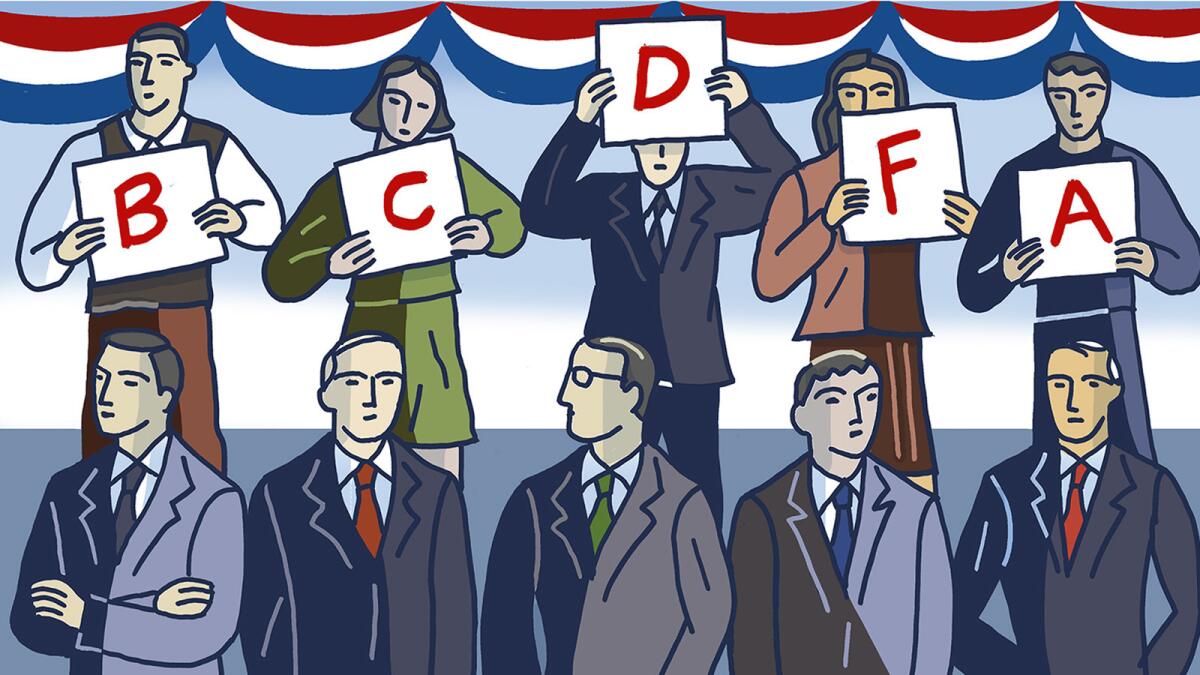Editorial: Times to issue report cards on L.A. leaders

- Share via
It’s been two years since Eric Garcetti became mayor of Los Angeles. His election was part of a changing of the guard in City Hall that also saw the arrival of a new controller and city attorney, as well as seven new City Council members.
The challenges that faced them were enormous. Los Angeles may still be big, beautiful and alluring to many, but its problems — rampant homelessness and inadequate public transportation, buckling sidewalks and underperforming schools, mind-numbing traffic and simmering racial tension — are legendary.
------------
FOR THE RECORD:
Report Cards 2015: A July 12 editorial introducing a new series assessing local and state officials said violent crime in Los Angeles increased 12% in the first six months of the year. Total crime increased 12%; violent crime increased 21%.
------------
So how are they doing? As part of a new series, The Times will begin issuing report cards next week to the top policymakers in City Hall. Rather than waiting until election season to endorse candidates, we will issue mid-term letter grades and job performance reviews to Controller Ron Galperin, City Atty. Mike Feuer, City Council President Herb Wesson and, finally, Garcetti. In the second phase of the project, we will publish report cards on selected county and state officials as well.
The grading process will be tough but fair, as generations of teachers have told generations of students. Leading an urban metropolis such as Los Angeles is a hard job; no single elected official should be expected to untie the knots of bureaucracy, reverse decades of under-investment in infrastructure or end income inequality in two years. But politicians will do a better job if they are held to high standards.
Are they keeping their campaign promises? Have they delivered on their rhetoric? Do they tackle the city’s fundamental problems or do they duck controversy in favor of safe or politically popular stances? Are they focused on the monumental problems at hand or on their next elections and their own careers? Do they represent all of Los Angeles, including its diverse communities, and think about the city as a whole?
Here’s why it matters. Los Angeles’ leaders must struggle to close the long-standing budget deficit and manage the creeping cost of employee pension and retirement benefits, which consume 20% of the city’s general fund (nearly four times more than they did in 2002). At the same time, they must confront a host of social problems, provide basic services and address a billion-dollar backlog of infrastructure needs. Can it all be done?
After a decade-long decline, Los Angeles just posted a startling 12% increase in violent crime for the first six months of 2015, a surge that has not yet been fully explained and that poses a challenge for the Los Angeles Police Department and its civilian overseers, for whom public safety is a top priority. Meanwhile, the department, like others across the nation, is under scrutiny for how its officers interact with black and Latino communities, and for its use of force against unarmed civilians. City Hall has taken credit for past reductions in crime. To what extent are elected officials accountable for the increasing problems, and what should they do to address the issues?
For all its strengths and attributes, Los Angeles is increasingly a city of haves and have-nots, where some residents are being priced out of their neighborhoods, where public schools fail to provide a path out of poverty for too many students, where there are too few middle-class jobs and there is too little affordable housing. But it is also a city where corporations feel underappreciated, saying that L.A.’s business taxes are too high and its government bureaucracy is too cumbersome. It is a city where even many Democrats concede that policy in City Hall is too often made to benefit labor unions — which donate liberally to city campaigns — rather than residents.
The goal of the report card project is threefold: to engage city residents; to lay out the key issues facing L.A. and California; and above all, to hold politicians accountable.
The four City Hall leaders whose report cards will be published in the first part of this project have different backgrounds and responsibilities. Not all are expected to grapple with the full range of the city’s issues. Galperin is serving his first term in public office, but Garcetti, Wesson and Feuer have all served in government for years, and therefore bear some level of accountability for past city action, or inaction, on these issues. All will be graded in the following broad categories:
Leadership. Does he (because there are only men in this initial group) set the right agenda and priorities — and follow through? Does he lead and persuade in a crisis or challenge others or hide behind them?
Effectiveness. Does he demonstrate the political and management skills to get things done? Does he have a record of success?
Vision. Does he articulate a vision for the city, his office or a particular issue? Does he press for badly needed, longer-term reforms?
Transparency. Is he honest and open with the public? Has he lived up to campaign promises?
Political courage. Does he stand up for his beliefs even when doing so might draw criticism or alienate supporters? Does he show a willingness to make hard decisions?
Want to weigh in? Tweet us your experiences, opinions or expectations of Galperin, Feuer, Wesson or Garcetti @latimesopinion #gradeyourgov or find us on Facebook.
Hoy: Léa esta historia en español
More to Read
A cure for the common opinion
Get thought-provoking perspectives with our weekly newsletter.
You may occasionally receive promotional content from the Los Angeles Times.






